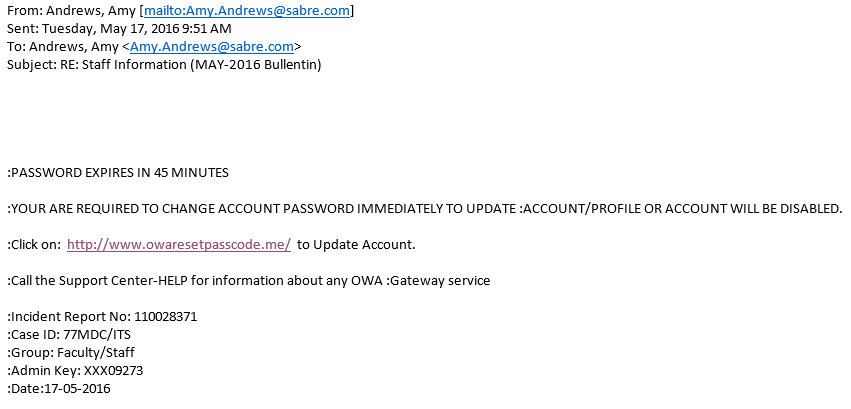...
These emails either include directions to reply with private information, or provide a link to a malicious web site to verify your account. Emails claiming very sudden changes or those that use poor spelling and grammar are clear warning signs of a fraudulent phishing email.
RECENT PHISHING ATTEMPTS
May 17 - Notice the following phishy things:
Phishing attempt filled with warning and urgency that your "PASSWORD EXPIRES IN 45 MINUTES" with a pretend Incident report number. The email addresses "From:" and "To:" name are @sabre.com, The URL(web link in the email) would send you to a web site that is definitely not Suffolk.edu.
May 11 - Notice the following phishy things:
Phishing attempt filled with warning and urgency that your mailbox needs updating "now" . The URL(web link in the email) would send you to a web site located in the United Kingdom - definitely not Suffolk.edu.
May 8 - Notice the following phishy things:
...
- Never send passwords, bank account numbers, social security numbers or other private information in an email.
- Avoid clicking links in emails, especially any that are requesting private information.
- Be wary of any unexpected email attachments or links, even from people you know.
- Never enter private or personal information into a popup window.
- Pay attention to the URL (the web site address in your browsers address bar). Look for 'https://' and a lock icon in your browser address bar and confirm the web site address before entering any private information on a website. Malicious websites may look identical to a legitimate site, but the URL may use a variation in spelling
What should I do if I have been scammed by phishing?
Contact the organization that was the target of the scam. Immediately change any passwords you might have revealed. If you used the same password for multiple resources, make sure to change it for each account, and do not use that password in the future. For Suffolk University accounts contact the Help Desk (617)557-2000. If you suspect a bank or credit card account may have been compromised, contact that institution to check your account immediately and request a credit report.
...



